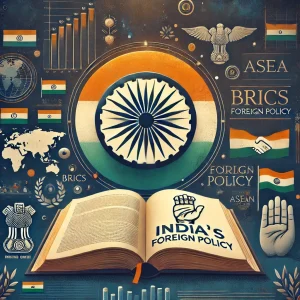The Importance of Understanding India’s Foreign Policy for UPSC
The foreign policy of India under the UPSC is not a chapter for the general studies paper, rather a throbbing, vibrant story carving out interrelationship of the country with global actors. It is imperative for any aspirant to understand this policy not just for the sake of being ready to take the exam, but also for developing a sophisticated perspective toward the manner in which India manages its role amidst a complex and dynamic world. Reasons why you need to deep-dive into India’s foreign policy and how you can effectively prepare for it:
1. A Core Component of General Studies Paper II
A huge chunk of questions in General Studies Paper II of the UPSC Civil Services Examination comprises questions related to India’s foreign policy, which in turn forms part of GS-II. The other broad areas included within the ambit of GS-II are topics related to Governance, Constitution, Polity, Social Justice, and International Relations. Many questions on foreign policy revolve around bilateral relations, regional groupings, and international institutions, besides India’s contributions to global concerns such as climate change, terrorism, and trade negotiations.
For instance, questions relating to India’s Act East Policy, strategic partnerships with the USA and Japan, and multilateral engagements like the United Nations, BRICS, and SAARC are asked time and again in both Prelims and Mains.
2. The Dynamic Nature of Current Affairs
India’s foreign policy changes day in and day out, depending on the flow of global events and changes in the geopolitical dynamics. Keeping an eye on the shift is important for UPSC aspirants, as questions often relate to recent developments—be it India’s response to the Russia-Ukraine conflict, its stand over China’s Belt and Road Initiative, or the QUAD alliance.
Candidates should regularly go through newspapers—The Hindu and Indian Express—especially the editorials and opinion pages. Other International channels for news can also be kept track of to get different perspectives on the same issue, like BBC, Al Jazeera, Reuters etc.
3. Enhancing Analytical Skills
An understanding of India’s foreign policy would not simply imply a devaluation of facts, but an analysis of the raison d’être behind India’s moves on the global platform. Why does India pursue a strategic partnership with certain countries while it remains non-aligned with others? How does India maintain relations between powers that are competitors with one another, such as the USA and Russia, or China and Japan?
These are the kinds of questions that require an in-depth analytical understanding, so important for attempting high-scoring answers in the Mains. Books to read for an analytical approach: “Pax Indica: India and the World of the 21st Century” by Shashi Tharoor—This book provides all-encompassing insight into India’s foreign relations and its challenges and opportunities in the global arena.
“India’s Foreign Policy” by V.P. Dutt – A more conventional approach toward understanding the evolution of India’s foreign policy since independence.
4. Building a Well-Rounded Perspective
Domestic policy, economic strategies, and security concerns impinge on the foreign policy of India. How one perceives this interlinkage is important in answering questions in both GS papers and the Essay paper. For instance, most of India’s economic policies towards neighboring countries are dictated by security concerns, while its stand on climate change gets decided by domestic environment challenges and international pressure.
They must also chalk out the course of India’s economic and security policies to come up with a comprehensive perception. Books like “The Oxford Handbook of Indian Foreign Policy” have a selection of essays that makes an inquiry into these linkages.

5. Application in Essay and Interview
Very few topics, like foreign policy of India, are a favourite not only in the GS papers but also in the Essay paper and UPSC interview. In the Essay paper, a number of topics require a balanced view of India’s role in global affairs, so a sound understanding of foreign policy is indispensable.
These would also include questions on foreign policy that would check not only your knowledge but also your critical thinking abilities and ability to express informed opinions. The interviewers may question you about India’s diplomatic strategies or its global image or even seek your views on current international issues.
Recommended Study Sources:
- The Hindu and Indian Express (Editorial Sections)
- Pax Indica by Shashi Tharoor
- India’s Foreign Policy by V.P. Dutt
- The Oxford Handbook of Indian Foreign Policy
- There are also online courses on specialized IR and India’s Foreign Policy under Rau’s IAS and Vision IAS.
Sleepy Classes offers IR courses for Optional and within General Studies. Click here to know more.




